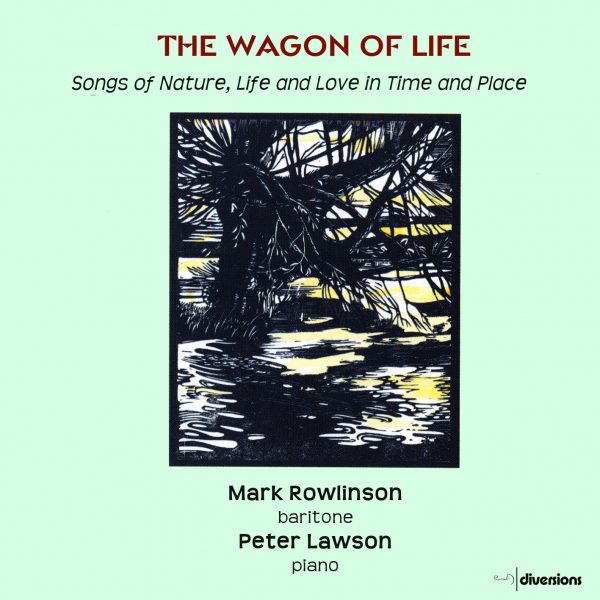Fanfare
The great British song tradition is encapsulated here. In an explanatory and somewhat apologetic note, Divine Art state that texts are no longer included in the in booklets but should be easily available online. Not that that should deter you. Mark Rowlinson is a superb baritone, his voice honeyed and lyrical (Thomas Pitfield’s By the Dee at Night is a case in point); Peter Lawson is a superb accompanist, and the whole is beautifully recorded at Chetham’s School of Music in Manchester (England).
The three songs by Thomas Pitfield (1903-1999) are followed by four by Stuart Scott (b. 1949). a close colleague of Pitfield and student of Lennox Berkeley. In fact, he sets two texts by Pitfield (“Alderley” and “Gawsworth”) before providing a stunning, suddenly surprisingly dark setting of Emily Bronte in Fall, Leaves, Fall. Fully within the British Pastoral tradition, Scott’s style is confident, with the dynamism of Night Clouds forming a contrast to the Bronte setting.
Setting Sassoon, Hardy, and Edmund Blunden respectively for his three offerings, Geoffrey Kimpton (b. 1927) displays a light touch: Faintheart at a Railway Station is glorious, with a piano part that is active, illustrative, and sounds like a joy to play. Peter Lawson delivers it wonderfully, while Rowlinson uses a perfectly apt declamatory style to deliver the words. Very different is Joanna Treasure’s Tango (Do you remember?), simultaneously joyous (no missing the tango rhythms) and nostalgic, this latter element prolonged in “I saw the girl,” a tale of remembered lost love, desolate and unutterably beautiful. Rowlinson’s softening of his tone as a phrase proceeds is most effective here.
John Ramsden Williamson has set over 100 texts by A. E. Housman, a poet who furnishes all three of the songs presented here. Two parodies of war surround the beautifully still White in the Moon, wherein Williamson takes the textures down to a mere sliver. My interview with Williamson around a release of his piano music is in Fanfare 33:5. From Williamson we move to Wilkinson — Stephen Wilkinson, to be precise, bom 1919 and at the time of writing some three weeks shy of his 100th birthday, so by the time you receive this he will be in receipt of his telegram from the Queen. It would be good to hear more of his music, as The Sunlight in the Garden glows from within (Rowlinson’s splendidly inviting tone works perfectly here) while The Garden offers more sprightly contrast, Rowlinson’s upper reaches coping well with the registral demands.
Few would need an introduction to Tennyson’s classic poem “Now Sleeps the Crimson Petal”: composed while on holiday in Greece, the setting exudes tranquility. We move to the Bible for Sacha Johnson Manning’s two songs, Psalms 101 and 93 respectively. Mercy, judgment, a song of praise: All traditional ingredients of the Christian belief system are presented in an atmosphere of serenity that could also reflect faith in the first song, while the second is more active. Nature feeds Kevin George Brown’s two songs, Dying Day (Larkin), heavy and low, against Description of Spring to a text by Henry Howard, Earl of Surrey (d. 1547). There is a magical element, surely, to the harmonies used in the latter, a sort of Ravelian haze, but with an English accent.
The only actual set of songs on the disc comes from David Golightly (born 1948), a set which reflects the composer’s interest in the old, pagan god of Hea. The harmonies in Songs of the Clifftop reflect this mysticism; the solo piano opening of “After the Kill,” swirls of post-impressionistic sound, reflects the otherworldliness of this music. Finally, a set of three songs to texts by Kathleen Collier by David Forshaw (b. 1938) begins with a song of astonishing gentleness, The Owl, Whale Song, which follows on, is so delicate it borders on the inaudible; the muscular strength of Horse offers a huge contrast (the poem is a catalog of mankind’s debt to our equine friends).
In short, this is a lovely collection of songs. The disc’s subtitle, “Songs of Nature, Life and Love in Time and Place” says it all. All credit to Mark Rowlinson and Peter Lawson for their splendid musicianship (a live recital of this music would be joy indeed) and to their sound team of David Ellis (producer) and Richard Scott (sound engineer).
@divineartrecordingsgroup
Search
Newsletter
A First Inversion Company
Registered Office:
176-178 Pontefract Road, Cudworth, Barnsley S72 8BE
+44 1226 596703
Fort Worth, TX 76110
+1.682.233.4978












